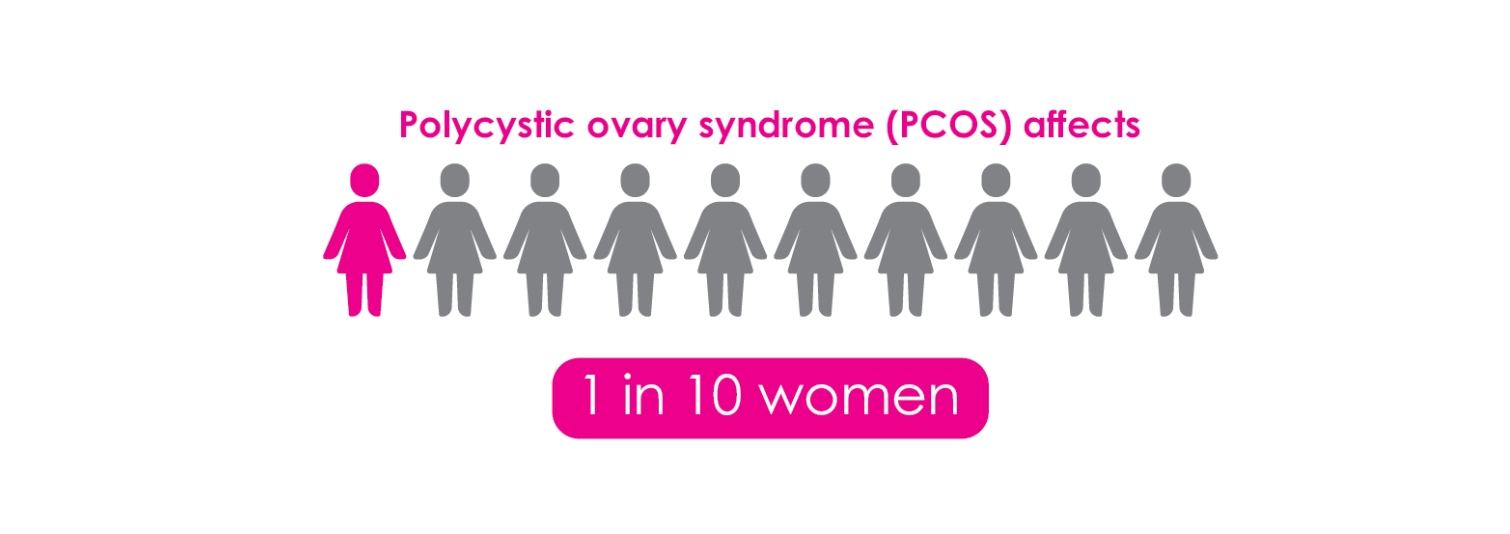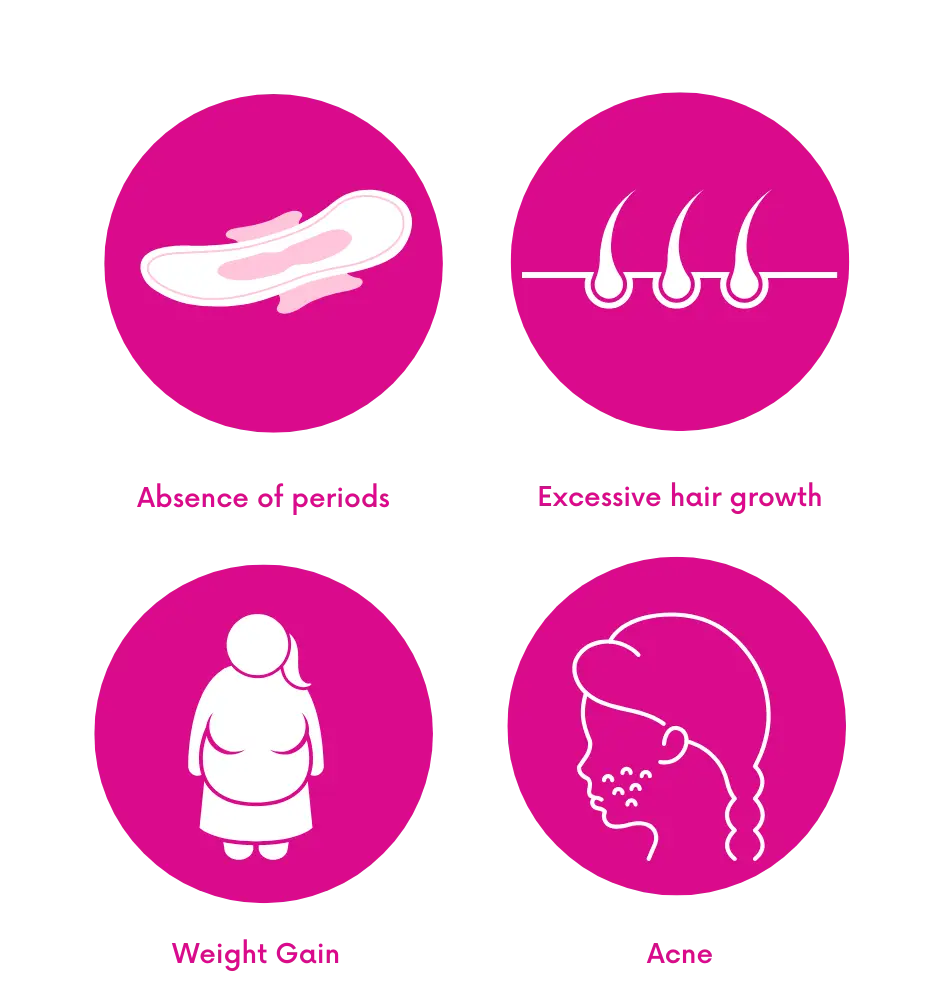What is Polycystic ovary syndrome (PCOS)?
Polycystic ovary syndrome (PCOS) is a common hormonal disorder that primarily affects women of reproductive. It is characterized by imbalances in reproductive hormones, which can lead to a range of physical and emotional symptoms.

One of the defining features of PCOS is the presence of multiple small cysts in the ovaries. Understanding PCOS is crucial for developing effective treatment approaches and lifestyle modifications to manage the condition. For those seeking effective PCOS treatment, it's important to consult with healthcare professionals who specialize in managing this condition.
With the right diagnosis and personalized treatment plan, individuals can find relief from its symptoms and improve their well-being.
Kovanci E, Buster JE. Polycystic ovary syndrome. Clin Gynecol. 2015. Second Edition.

Symptoms of PCOS
PCOS can present differently from person to person, but common symptoms include irregular menstrual cycles or the absence of periods, excessive hair growth on the face or body, acne or oily skin, weight gain or difficulty losing weight, mood swings or depression, and hair thinning or loss on the scalp.
Causes and Risk Factors
- The exact cause of PCOS remains unknown, but several factors contribute to its development, known as PCOS causes.
- These include hormonal imbalances, insulin resistance, genetic predisposition, and lifestyle factors such as a sedentary lifestyle, poor diet, and high stress levels.
- These factors can disrupt the delicate balance of reproductive hormones in the body, leading to the manifestation of PCOS symptoms.
- Understanding the underlying causes of PCOS is crucial in developing effective treatment approaches and lifestyle modifications to manage the condition.
- By addressing these contributing factors, individuals can take proactive steps towards improving their hormonal balance and overall well-being.
Chiu TTY, Rogers MS. Low ELK, Britton-Jones CM, Cheung LP. Haines CJ. Follicular and mum concentrations of myo-inositol in patients undergoing VF relationship with oocyte quality. Hum Reprod. 2002:17:1591-6
Diagnosing PCOS
Diagnosing PCOS involves a thorough medical history evaluation, physical examination, and specific tests.
These may include assessing menstrual patterns and symptoms, checking for signs of hormonal imbalance during a physical examination, blood tests to measure hormone levels, glucose tolerance, and lipid profile, as well as a pelvic ultrasound to examine the ovaries.
Long-Term Health Risks
PCOS is associated with an increased risk of developing various long-term health conditions.
These include type 2 diabetes, cardiovascular diseases, sleep apnea, and endometrial cancer (cancer of the lining of the uterus). Regular monitoring and proactive healthcare management can help mitigate these risks.
Managing PCOS
- PCOS is a complex hormonal disorder that affects many women worldwide, including those in Pakistan.
- Understanding PCOS is essential to raise awareness about the condition and available treatment options, particularly for women seeking its treatment.
- By understanding the nature of this condition and exploring suitable treatment approaches, individuals can take proactive steps towards managing PCOS and improving their overall well-being.
- Empower yourself with knowledge about the treatment of PCOS, and embark on a journey towards a better quality of life.
- Remember, there are PCOS solutions available to support you in your PCOS treatment journey
- For those seeking a comprehensive solution for PCOS, GeneoovaTM offers a breakthrough treatment option.
- GeneoovaTM is a scientifically formulated PCOS supplement specifically designed to target the root causes of PCOS, promoting hormonal balance and overall well-being.
- With its unique blend of natural ingredients, GeneoovaTM is a trusted choice for healthcare professionals for their patients and individuals looking for an effective solution to manage the symptoms regarding PCOS .
- By addressing the underlying hormonal imbalances associated with PCOS, GeneoovaTM aims to provide relief and support to those struggling with this condition.
- If you are searching for a reliable PCOS treatment, consider GeneoovaTM as your ally on your journey to better health.
Health Care Professionals
Polycystic ovary syndrome (PCOS) is a prevalent endocrine disorder that affects women of reproductive age.
Understanding PCOS is essential for healthcare professionals seeking a comprehensive approach to managing the condition and providing effective treatment. It is characterized by hyperandrogenism, ovulatory dysfunction, and polycystic ovarian morphology.
The exact aetiology of PCOS remains multifactorial and is believed to involve a combination of genetic, environmental, and metabolic factors.
Clinical presentation of PCOS may include irregular menstrual cycles, obesity, hirsutism, acne, alopecia, and infertility. These manifestations arise from underlying hormonal imbalances, such as elevated luteinizing hormone (LH), insulin resistance, and increased androgen production.
When diagnosing PCOS in healthcare settings, it is essential to employ a comprehensive approach. This typically involves a thorough medical history assessment, physical examination, and laboratory investigations. Diagnostic criteria commonly utilised include the Rotterdam criteria, which require the presence of at least two out of three features: oligo- or anovulation, clinical or biochemical signs of hyperandrogenism, and polycystic ovaries on ultrasound.
The management of symptoms of PCOS aims to alleviate discomfort, restore menstrual regularity, improve fertility outcomes, and reduce long-term health risks. Lifestyle changes, such as weight loss, exercise, and dietary adjustments, play a vital role in managing the symptoms of PCOS, particularly in cases of obesity and insulin resistance. Medications and fertility treatments may be used as necessary. Healthcare professionals employ a comprehensive approach tailored to each patient's needs to effectively address PCOS and it’s symptoms and enhance overall well-being.

Pharmacological interventions are often employed to address specific aspects of PCOS. First-line treatment options for menstrual irregularities and hyperandrogenism include combined oral contraceptives (COCs) and antiandrogens, respectively. For individuals desiring pregnancy, ovulation induction agents such as clomiphene citrate and letrozole are commonly prescribed. In cases of infertility resistant to ovulation induction, assisted reproductive technologies may be considered.
In recent years, there has been growing interest in the role of nutraceuticals and complementary therapies in the management of PCOS. These include supplements such as myo-inositol, omega-3 fatty acids, and N-acetylcysteine, which have shown promising results in improving hormonal balance and metabolic parameters.
For healthcare professionals seeking a comprehensive approach to managing PCOS and providing effective treatment, it is crucial to stay updated with the latest research and evidence-based guidelines specific to the region. Understanding PCOS is essential to detect and address long-term health risks associated with the condition, including cardiovascular diseases, type 2 diabetes, and endometrial cancer. By staying informed and utilizing the best practices, healthcare professionals can ensure optimal care and improved
outcomes for individuals with PCOS

